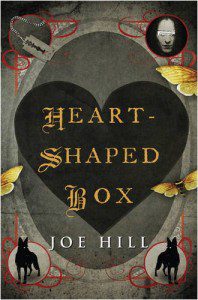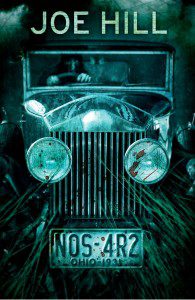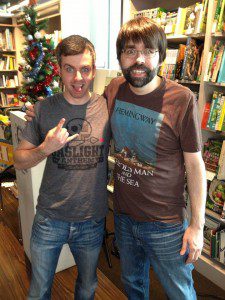This Is Horror News Editor Dan Howarth caught up with Joe Hill at the Twisted Tales signing event at Waterstones in Liverpool One. Joe was over in the UK on a seven date signing tour to promote his new novel NOS4R2. Dan took the opportunity to sit down with Joe and ask him about female protagonists, vampire mythology and horror in general.
For the full audio of the interview (and pre-interview banter) and a brief review of the event as a whole check out Episode 009 of the This Is Horror podcast.
 Not all of your stories are what would be classed as traditionally frightening. What is your main intention when you sit down to write a story? And do you find that now you are classed as a horror writer your work comes with a certain expectation?
Not all of your stories are what would be classed as traditionally frightening. What is your main intention when you sit down to write a story? And do you find that now you are classed as a horror writer your work comes with a certain expectation?
JH: You know it used to make me nuts. I was a kid who read Fangoria magazine faithfully, month by month – that was my Rolling Stone. It was and is a magazine dedicated mostly to the art of splatter special effects. It used to make me nuts when I’d read an article about some film and the director would make a snooty pronouncement like “I don’t really think of myself as a horror director.” The dude is directing Sorority Slaughterhouse 7 and you’re thinking to yourself “oh yeah, you’re totally Fellini.” So I hesitate to say this but I don’t really sit down and think of myself as a horror writer.
I have written two horror novels – Heart-Shaped Box is very much a scary novel and the whole idea of NOS4R2 was to construct a book that would feel like a rollercoaster ride in the dark. I’m very comfortable doing that and I’m very comfortable talking about those books as horror novels but I also think of them as novels with modest literary ambitions and stories of character that could be interesting to people that don’t necessarily read horror fiction. Horns, my second novel, has often been characterised as a horror novel. I don’t really think it is, the viewpoint character is a man turning into a devil and I don’t know how something works as horror when the hero is the monster. I think that in a lot of ways Horns is a tragic romance with supernatural underpinnings.
That’s exactly how I saw it in terms of the central love story, more than anything that was what stood out.
JH: It has some satirical elements to it as well. A lot of my stories – several of my short stories in 20th Century Ghosts – are horror stories, several others are weird fantasy, there’s a romance in that book as well called ‘Bobby Conroy Comes Back From the Dead’. There are some historical pieces and I’ve always enjoyed historical fiction and do plan to write some. I guess what I would say is that it hasn’t changed my thinking. The idea that I’m identified as a horror writer hasn’t really changed my thinking in any way. It’s great to write a story that scares people and that’s something I’m sure I’ll do a lot more of. I’m a big believer in suspense more than anything. I can imagine writing fiction that is not something you would classify as horror but I can’t imagine writing something that was free of a major element of suspense because I trust suspense and it’s what keeps people turning the pages.
Your character interactions are very believable. Are you the kind of guy that sits in a coffee house observing people’s behaviour or has the authenticity come through from the way that you’ve read books yourself?
JH: I heard a story about David Mamet that he used to ride subways and would copy down things people were saying. Finally that rumour circled for so long and intensified to such a degree that David Mamet addressed it and said it was nonsense, that he had never once done that. I was kind of glad to hear it as I didn’t really believe it. I like dialogue – I like to write dialogue. Reading action is exciting and dialogue is a form of action. A great conversation is often more thrilling than watching two people wrestle over a gun. In fact the right conversation feels like two people wrestling over a gun.
A case in point would be The Social Network, a film where people just talk for two hours yet it’s a story that really drives forward from the start.
JH: Absolutely! A lot of what works best in John Carpenter’s The Thing isn’t the actual battles with the monster but the increasingly desperate arguments over how to figure out who is the monster. Which is also a reminder of what Alfred Hitchcock talked about – the explosion isn’t as interesting as the bomb ticking under the desk. The build-up of suspense – waiting to see if anyone is going to spot the bomb, find the bomb, stop the bomb – that is much more exciting than the bomb actually going off.
 Moving on to your new book NOS4R2, some of the scenes in it are incredibly harrowing. The phone calls from the dead children, Christmas music playing in the middle of the summer, it makes the hairs stand up on the back of your neck. What is it that makes Christmas so macabre for you? It’s a strange time of year to write about when the novel isn’t actually set then.
Moving on to your new book NOS4R2, some of the scenes in it are incredibly harrowing. The phone calls from the dead children, Christmas music playing in the middle of the summer, it makes the hairs stand up on the back of your neck. What is it that makes Christmas so macabre for you? It’s a strange time of year to write about when the novel isn’t actually set then.
JH: Well that’s the thing; the book isn’t really a Christmas novel. Mostly it takes place across a variety of summers. It’s no more a Christmas novel than Shane Black’s movies are Christmas movies. Shane Black of course did Lethal Weapon and Kiss Kiss Bang Bang.
Die Hard (Joel Silver) isn’t really a Christmas movie but boy it sure is fun to watch it in December.
Some would say it’s the ultimate Christmas movie.
JH: You’re right, some would say it’s the ultimate Christmas movie.
So there is this place where children go after they have been ruined by my bad guy Charlie Manx – after he is done with them there really isn’t anything left of them other than teeth. He dumps them in this frightening amusement park called Christmasland. Every morning is Christmas morning and every evening is Christmas Eve. The fun never really stops. Charlie just loves Christmas. I guess what I was thinking about when I went to work on the book is a thing that Lon Chaney said “there’s nothing funny about a clown at midnight”. I always thought “what a great line” and I think that the business of horror – the business of scaring people – is often about making these juxtapositions between what’s innocent and harmless and what’s deranged and upsetting. Christmas music on December 21 is fine. But if you’re out in the woods in the middle of the summer, on a thunderstormy day and you walk by an old cottage with the windows smashed in and there’s nothing in there but darkness and cobwebs and then you hear a voice singing ‘Jingle Bells’, you know you’re gonna run not walk away from that place as fast as possible. So that’s what you’re looking to do, you’re looking to jar the reader with those upsetting juxtapositions. I also think back to another quote which is someone talking about Tobe Hooper and The Texas Chainsaw Massacre. They said it was less like the movie was about a mad man, more like it was directed by a mad man. I always thought that was partially what you want to do, you really wanna give the reader the impression that there is a psychopath behind the wheel and that you’ve gotta buckle up. They don’t really know where this thing is going but it’s probably not going to stay on the road. I like to try and create that feeling if I can.
We would like to extend our thanks to Joe Hill for giving up his time in his busy signing schedule and also to Jon Weir for his help in making this interview happen. Keep an eye on the This Is Horror website for Part II.
DAN HOWARTH
—
If you enjoyed our interview with Joe and want to read his fiction, please consider clicking through to our Amazon Affiliate links and making a purchase today. If you do you’ll help keep the This Is Horror ship afloat with some very welcome remuneration.










